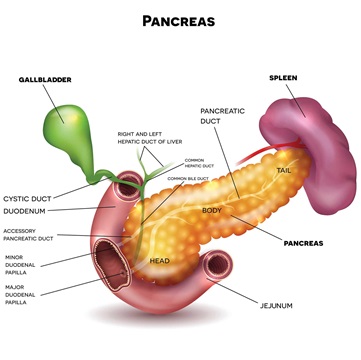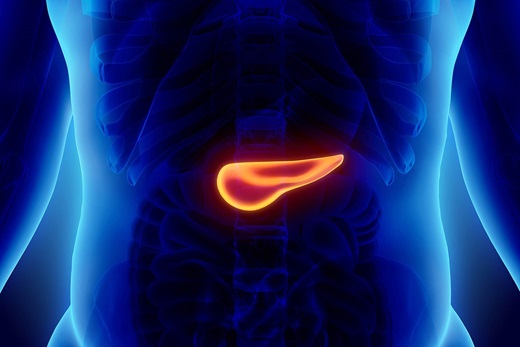Pancreatic Cancer Symptoms
Reviewed By:
Catching pancreatic cancer early is challenging because patients rarely experience the signs of pancreatic cancer until the disease has progressed or spread. Therefore, pancreatic cancer is typically diagnosed at later stages, making long-term prognosis and survival rates much lower than other cancers. Experiencing several common symptoms may indicate pancreatic cancer at an advanced stage, or an unrelated medical condition.

Tumor Location Impacts Symptoms
The location of the tumor in the pancreas affects the types of symptoms and how soon they might start to show. For example, jaundice symptoms may appear when the tumor obstructs the head of the pancreas.
If the tumor is in the body or tail of the pancreas, pain and weight loss might be more likely. Pancreatic cancer in the body or tail can also take longer to present with symptoms, allowing the tumor more time to grow or metastasize before it’s found.
Common Symptoms of Pancreatic Cancer
The following are the most common signs of exocrine pancreatic cancer, specifically for pancreatic adenocarcinoma. This cancer starts in the ducts of the pancreas and represents more than 90% of all diagnoses. Neuroendocrine tumors are much less common and may present different symptoms.
Patients may experience symptoms differently and should not expect to manifest all symptoms listed.
Stomach and Back Pain
A common symptom of pancreatic cancer is a dull pain in the upper abdomen (belly) and/or middle or upper back that comes and goes. This is probably caused by a tumor that has formed in the body or tail of the pancreas because it can press on the spine.
Some patients describe pain starting in the middle abdomen and radiating into the back. Pain can be worse when lying down and can often be relieved by leaning forward. Pancreatic cancer pain can differ from person to person, so be sure to discuss any new pain-related symptoms with your doctor.

Jaundice
While many pancreatic cancer symptoms are first attributed to something else (e.g., gastrointestinal issues or stress), symptoms caused by jaundice usually can’t be ignored. Jaundice in pancreatic cancer is painless and occurs when the tumor in the head of the pancreas blocks the bile duct, causing symptoms such as:
- Yellowing of the skin and eyes
- Dark urine
- Pale, greasy stools that float in the toilet
- Pruritus (itchy skin)
Weight Loss
Unintentional weight loss or significant, unexplained weight loss is usually a sign that something is wrong in the body. Weight loss is one of the more common symptoms of pancreatic cancer.
Gastrointestinal (GI) Problems
Some GI-related pancreatic cancer symptoms can be caused by the tumor pressing on the stomach or other parts of the digestive system as the tumor spreads. These may include the following:
- Loss of appetite
- Indigestion
- Nausea
- Vomiting
- Bloating or swelling in the abdomen
Fatigue
Extreme tiredness may be a sign of pancreatic cancer, but it’s also a common sign of other conditions. Either way, unexplained fatigue should not be ignored.
Diabetes
When an early diagnosis of pancreatic cancer does occur, it’s usually because it was caught by a medical imaging scan for another condition or another suspicious diagnosis such as diabetes.
Pancreatic cancer may trigger sudden onset diabetes unrelated to weight gain, or late onset diabetes without an obvious cause. Pancreatic cancer can destroy the cells that make insulin, causing blood sugar levels to rise. While cancer is most likely not the culprit, a patient with a new and suspicious diabetes diagnosis should be evaluated to rule out pancreatic cancer.
Meet Our Pancreatic Cancer Experts

Our team is a world leader in the diagnosis and management of pancreatic cancer, leading all institutions in novel therapies and innovative clinical trials.
Symptoms That Resemble Other Conditions
The symptoms of pancreatic cancer may be similar to those of other conditions or medical problems, which can delay diagnosis even further. Upon diagnosis, patients often look back and start to make a connection between various symptoms that seemed unrelated or unremarkable at the time.
Listen to your body and consult with your doctor about any new symptoms you may be experiencing, even if you think they can be explained. While cancer is probably not the culprit, diagnostic tests can help to confirm the case.





